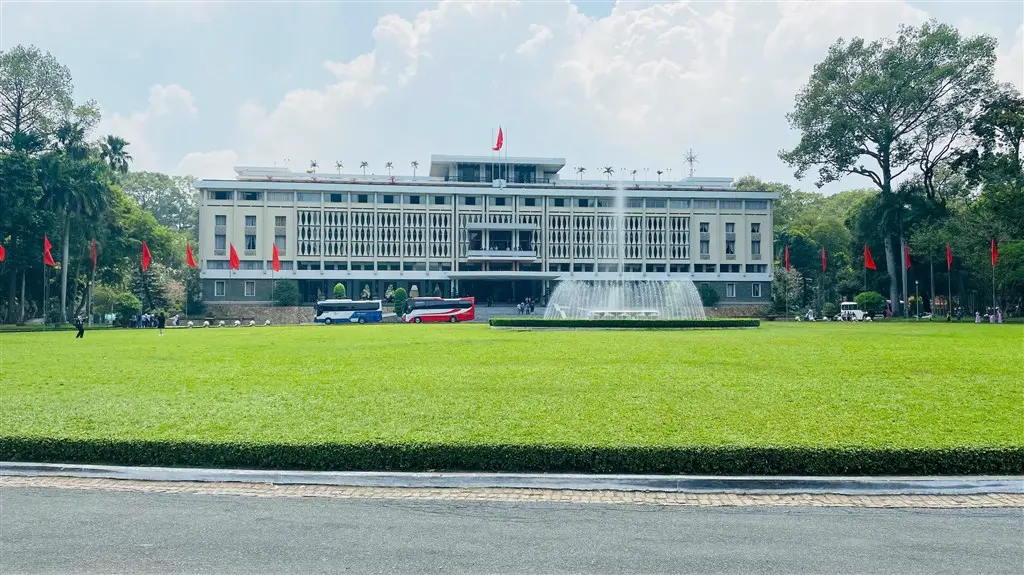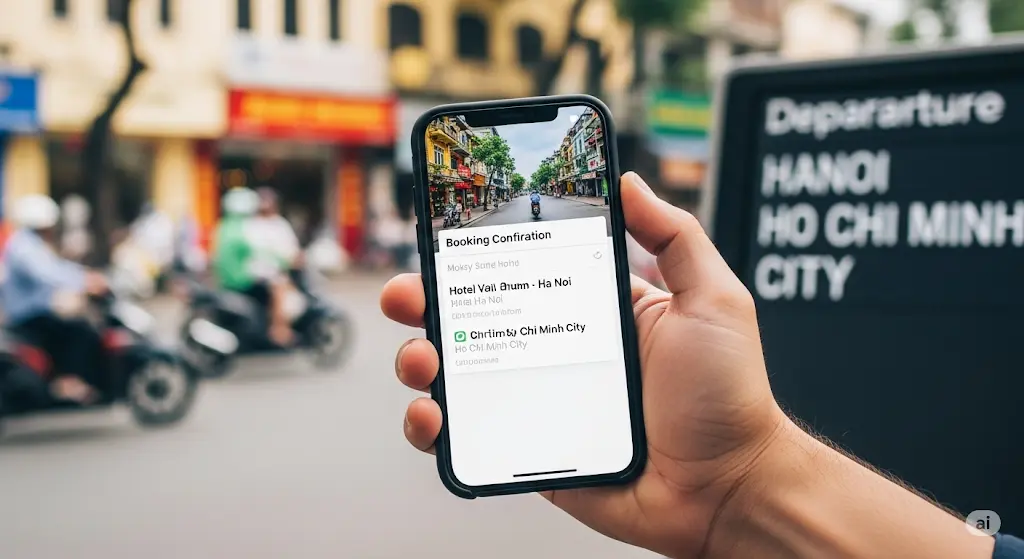Vietnam, a country of breathtaking landscapes, vibrant culture, and rich history, beckons travelers from across the globe. Yet, a common question arises during travel planning: is Vietnam safe to travel? This query is a fundamental part of destination research, reflecting valid safety concerns. At EssentialVietNamtravel.com, we understand that assessing risk and seeking reliable travel advice are crucial before embarking on any journey.
This comprehensive guide aims to address your concerns, providing a factual and detailed look into vietnam safety, helping you understand how safe is vietnam for tourists and what to expect. We will explore various aspects of vietnam travel safety, from general security to specific health precautions, ensuring you have the information needed to make an informed decision and prepare for a memorable trip. Many wonder, is it safe to travel to vietnam right now? We’ll delve into that.
Understanding Overall Vietnam Travel Security: Is Vietnam Safe for Your Trip?
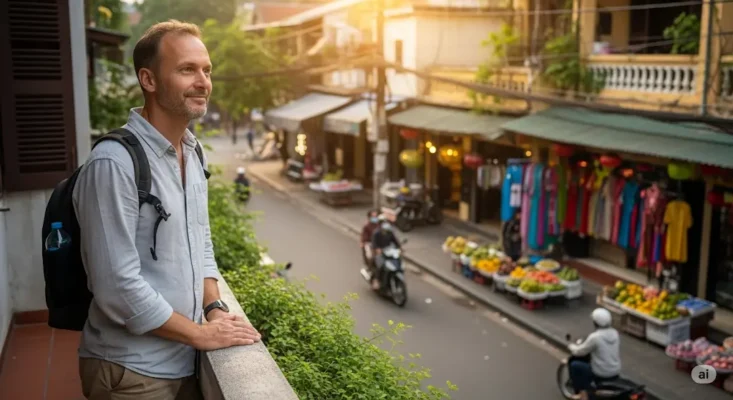
When considering a trip to Southeast Asia, the question “is vietnam safe?” frequently comes up. For potential visitors, especially those contemplating if is vietnam safe for American tourists, understanding the general vietnam travel security landscape is paramount. The good news is that Vietnam is widely regarded as a safe destination for tourists. The country boasts a low violent crime rate, particularly against foreigners.
This general safety status contributes to its popularity. However, like any travel destination, it’s not entirely without risks. Petty crime, such as pickpocketing and bag snatching, can occur, especially in crowded tourist areas and on public transport. Therefore, while vietnam is safe to travel for the most part, awareness and basic precautions are essential.
Many travelers ask, “is it safe to go to vietnam?” and the answer from countless visitors is a resounding yes, with the caveat of being sensible. The political stability in Vietnam is high, contributing to a secure environment. The government prioritizes tourist safety, understanding the importance of tourism to the national economy. You will find tourist police in major cities and popular sites, ready to assist.
While official vietnam travel warnings are rare for the country as a whole, it’s always wise to check your home country’s travel advisories for the most current information before you depart. These advisories often provide specific travel advice. The overall risk for tourists is generally considered low to moderate, making it a viable option for many, including those wondering if is vietnam safe for families with children. The focus for travelers should be less on major security threats and more on minor, opportunistic crimes. Understanding this distinction is key to a realistic risk assessment.
If you are considering “is vietnam safe to visit,” the broad consensus is positive, supported by the experiences of millions who travel there annually. EssentialVietNamtravel.com believes that with proper awareness, your journey to explore Vietnam can be a secure one. Remember, while the country is generally safe, your personal safety also depends on your actions.
Navigating Potential Concerns: Common Crime in Vietnam for Tourists and Staying Alert in Hanoi and Ho Chi Minh City.
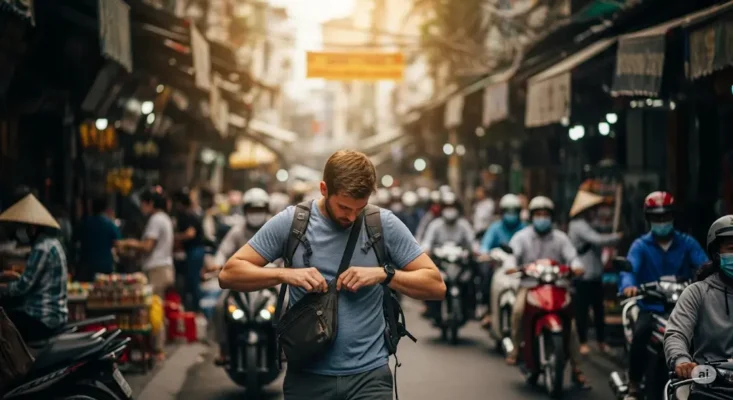
While Vietnam enjoys a reputation for safety, it is important for travelers to be aware of common crime in vietnam for tourists. Understanding these potential issues, particularly in bustling urban centers like Hanoi and Ho Chi Minh City, allows for proactive prevention. The most prevalent concerns are petty theft and scams, rather than violent crime. Pickpocketing is a common risk, especially in crowded markets, on buses, or at popular tourist attractions.
Bag snatching, often by thieves on motorbikes, can also occur, particularly if bags are worn loosely or valuables are openly displayed. Ho Chi Minh City crime, similar to Hanoi safety concerns, revolves around these opportunistic acts.
One of the most frequently mentioned tourist scams in vietnam involves taxis. This can range from inflated fares due to “broken” or rigged meters (the classic TaxiMeterScam) to unnecessarily long routes. To mitigate this, always opt for reputable taxi companies like Mai Linh or Vinasun, and ensure the meter is on and running correctly. Ride-hailing apps like Grab are also widely used and generally offer transparent pricing.
Another common scam involves vendors or street sellers overcharging tourists. It is advisable to agree on a price before committing to a purchase or service. Be cautious of overly friendly strangers who may try to lure you into a scam, such as a rigged card game or an invitation to a “special” tea ceremony that ends with an exorbitant bill.
In Hanoi, particularly in the Old Quarter, and in Ho Chi Minh City’s District 1, vigilance is key. Keep your belongings secure and close to your body. Avoid displaying large amounts of cash or expensive jewelry. When walking, be mindful of your surroundings, especially in regards to motorbike traffic, as snatch-and-grabs can happen quickly.
The night safety in Hanoi’s tourist areas is generally good, but like any large city, it’s wise to stick to well-lit areas and avoid walking alone late at night if you are unfamiliar with the surroundings. Similarly, Ho Chi Minh City night safety requires caution in some areas, especially less crowded ones. By being aware of these potential issues and taking simple precautions, you significantly reduce your risk and can enjoy the vibrant atmospheres of Vietnam’s major cities.
The tourist police are present, but prevention is always your best first line of defense. Knowledge about common scams in Vietnam is a powerful shield. Many ask “is hanoi vietnam safe?” and the answer is yes, with these common-sense precautions.
Practical Vietnam Tourist Safety Tips for a Secure Journey.
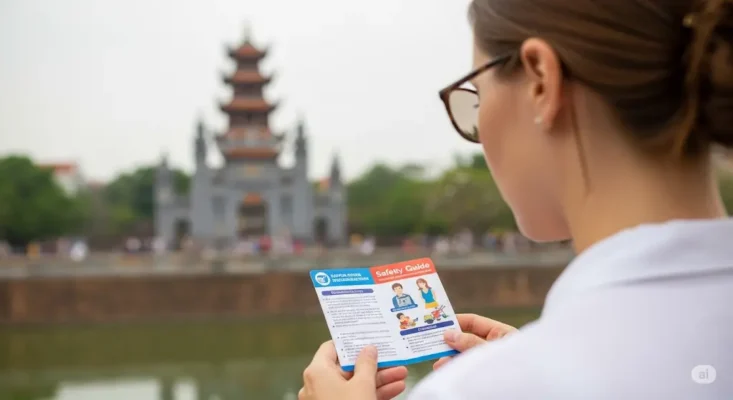
Ensuring your vietnam travel safety involves a combination of awareness, preparation, and common sense. These practical vietnam tourist safety tips, curated by EssentialVietNamtravel.com, can help you navigate the country with confidence. These guidelines are designed to be clear and actionable, enabling anyone to implement them.
Before You Go:
Research Your Destination: Familiarize yourself with the areas you plan to visit. Understand local customs and any specific safety concerns for those regions. Information influences decisions, and knowing what to expect can prevent many issues. Destination research is a key part of travel planning.
Get Travel Insurance: This is non-negotiable. Travel insurance should cover medical emergencies, theft, and trip cancellations. Ensure it includes coverage for activities you plan to undertake, like motorbiking if applicable. This is a critical recommendation for peace of mind.
Inform Someone of Your Plans: Leave a copy of your itinerary with family or friends back home. Check in regularly.
Make Copies of Important Documents: Keep digital and physical copies of your passport, visa, flight tickets, and insurance details separate from the originals. A passport is your most vital document.
Check Official Travel Advisories: Review current vietnam travel advisories from your government for the latest safety information and any vietnam travel warnings.
During Your Trip: Personal Safety
Be Aware of Your Surroundings: This is especially crucial in crowded markets, tourist hotspots, and on public transport. Pay attention to who is around you.
Secure Your Valuables: Use a money belt or a secure cross-body bag. Avoid displaying large amounts of cash or expensive jewelry. Do not leave valuables unattended, even in hotel rooms (use the safe if available). High petty theft focus means you should be diligent.
Watch Out for Snatch-and-Grab Theft: Thieves on motorbikes may target bags and phones. Keep your bag on the side of your body away from the road, and be discreet with your phone in busy street areas.
Be Cautious with Strangers: While Vietnamese people are generally friendly and hospitable, be wary of unsolicited offers that seem too good to be true. This can help avoid common scams.
Night Safety: Stick to well-lit and populated areas at night. If you are unsure about an area, take a reputable taxi or a ride-hailing service. If you are a solo female traveller wondering “is vietnam safe for solo female travellers?”, the answer is generally yes, but these precautions are especially important.
Ready to Plan Your Adventure?
Now that you know how to stay safe, it’s time for the fun part! Find the best flight deals to Vietnam and start building your dream trip.
During Your Trip: Transportation Safety
Choose Reputable Taxis/Ride-Hailing: Opt for well-known taxi companies like Mai Linh or Vinasun, or use ride-hailing apps like Grab. Always ensure the meter is used in taxis, or agree on the fare beforehand if using a cyclo or xe om (motorbike taxi). Transportation risks are real, but manageable.
Motorbike Safety: If you rent a motorbike, ensure you have a valid license and always wear a helmet. Understand that traffic in Vietnam can be chaotic (distinct traffic patterns). If you are not an experienced rider, consider alternatives. Road safety can be challenging.
Overnight Buses and Trains: These are common modes of transport. Secure your luggage and keep valuables with you.
During Your Trip: Other Tips
- Learn Basic Vietnamese Phrases: Knowing a few phrases can be helpful and is often appreciated.
- Respect Local Culture: Dress modestly when visiting temples and pagodas. Understanding cultural etiquette safety can prevent misunderstandings.
- Bargain Politely: Bargaining is common in markets, but do so with a smile.
By following these safety tips for travelling in vietnam, you can significantly enhance your personal security and focus on enjoying the incredible experiences Vietnam offers. The goal is not to be fearful but to be informed and prepared. Positive reviews often suggest safety, and your preparation will contribute to a positive experience.
Health on the Go: Key Vietnam Health Risks Travel and Precautions.
Maintaining good health is integral to enjoying your travels. When considering “is vietnam safe to travel to,” understanding potential vietnam health risks travel and how to mitigate them is essential. EssentialVietNamtravel.com advises a proactive approach to health vietnam while exploring this beautiful country.
Before You Travel:
Consult Your Doctor: Visit your doctor or a travel clinic at least 4-6 weeks before your trip. Discuss your itinerary and any pre-existing medical conditions. They can advise on necessary vaccinations and preventative measures. This is a key part of your travel advice.
Vaccinations: Ensure your routine vaccinations are up to date. Depending on your travel style and duration, your doctor might recommend vaccinations for Hepatitis A, Typhoid, Tetanus, and possibly others like Hepatitis B, Rabies, or Japanese Encephalitis. These are specific infection risks to discuss.
Malaria and Dengue Fever: Malaria risk is low in most tourist areas but can be present in some rural, remote regions. Dengue fever, transmitted by mosquitoes active during the day, is a risk throughout Vietnam, especially during rainy seasons. Discuss preventative measures like antimalarials (if necessary for certain areas) and mosquito bite prevention with your doctor.
Pack a Travel Health Kit: Include essentials like pain relievers, antiseptic wipes, bandages, motion sickness medication, diarrhea medication (e.g., Loperamide), and any personal prescription medications (with a copy of your prescription). Also, consider an antihistamine.
During Your Trip: Preventing Illness
- Food and Water Safety: This is a major concern for many travelers.
- Water: Do not drink tap water. Stick to bottled water (check the seal is intact), boiled water, or purified water. Avoid ice in drinks unless you are certain it is made from purified water (common in reputable restaurants and hotels). BottledWaterRecommended is a strong guideline.
- Food: Street food is a highlight of Vietnamese cuisine, but exercise caution. Choose stalls that are busy and look clean, where food is cooked fresh in front of you. Peel fruits yourself. Avoid raw or undercooked meats and seafood. If food looks like it has been sitting out for a while, it’s best to avoid it. Food and water safety practices are vital. If you experience sickness in vietnam, it’s often related to food or water.
- Mosquito Bite Prevention: This is crucial to prevent dengue fever and other mosquito-borne illnesses.
- Use an effective insect repellent containing DEET, Picaridin, or Oil of Lemon Eucalyptus. Vietnam insect repellent or bug spray vietnam should be applied regularly, especially during dawn and dusk when mosquitoes are most active (though dengue mosquitoes bite during the day). The best bug repellent for vietnam is one you will use consistently. Reapply after swimming or sweating.
- Wear long-sleeved shirts and long pants, especially in rural areas or during evenings.
- If your accommodation is not air-conditioned or well-screened, consider using a mosquito net.
- Sun Protection: The sun can be intense in Vietnam. Use sunscreen, wear a hat, and stay hydrated.
- Hand Hygiene: Wash your hands frequently with soap and water, especially before eating. If soap and water are not available, use an alcohol-based hand sanitizer. This simple step can prevent many common travel illnesses.
- Animal Safety: Avoid contact with animals, including dogs and monkeys, to reduce the risk of rabies.
What if you get sick? If you experience vietnam illness, seek medical attention. Medical facilities in urban areas like Hanoi and Ho Chi Minh City have good quality hospitals and clinics catering to foreigners (MedicalFacilities,UrbanQuality,Good). In rural areas, medical facilities can be more basic (MedicalFacilities,RuralQuality,Basic). Your travel insurance should cover medical expenses. The concept of vietnam care involves being prepared for such eventualities.
By taking these health precautions for vietnam, you can significantly reduce your risk of getting sick and ensure a healthier, more enjoyable trip. Remember, prevention is key when it comes to health while traveling.
Staying Prepared: Accessing Vietnam Emergency Services and Official Guidance.
No matter how carefully you plan, unforeseen situations can arise. Knowing how to access vietnam emergency services and where to find official guidance is a critical aspect of ensuring your vietnam safety. EssentialVietNamtravel.com emphasizes preparedness as a cornerstone of responsible travel.
Emergency Numbers in Vietnam: It is vital to save these numbers in your phone or keep them written down in an accessible place.
- Police: 113 (Vietnam,EmergencyPolice,113)
- Fire Department: 114
- Ambulance/Medical Emergency: 115 (Vietnam,EmergencyAmbulance,115)
While English may not always be spoken by the operator initially, especially in more remote areas, they can usually find an English-speaking person or understand the urgency if you clearly state “Emergency” and your location if possible. In tourist areas, hotel staff can also assist in contacting emergency services. The vietnam police are generally helpful to tourists.
Official Guidance and Consular Assistance:
Your Embassy or Consulate: Before you travel, register your trip with your country’s embassy or consulate in Vietnam if they offer such a service. They can provide assistance in emergencies, such as a lost passport, serious illness or injury, or if you become a victim of crime. Know their contact details and location in Hanoi or Ho Chi Minh City. For instance, if you are wondering “is vietnam safe for americans to travel to,” your local US embassy can be a resource.
Official Travel Advisories: As mentioned earlier, regularly check your home country’s travel advisories (e.g., from the U.S. Department of State, UK Foreign, Commonwealth & Development Office, etc.). These provide current information on safety and security, health, local laws, and entry requirements. They may issue a vietnam travel alert if circumstances change significantly. These advisories help you assess if “is it safe to travel to vietnam right now.”
Local Authorities: In non-emergency situations where you need assistance or to report a minor incident, you can contact the local tourist police or regular police stations. They are becoming more accustomed to assisting tourists.
Other Preparedness Measures:
- Communication: Ensure you have a way to communicate. Consider getting a local SIM card for your phone for easy local calls and data access. Many establishments offer Wi-Fi.
- Insurance Details: Keep your travel insurance policy number and their 24-hour emergency contact number readily available. Inform them promptly if you require medical treatment or encounter a situation covered by your policy.
- Backup Funds: Have access to emergency funds, perhaps through a separate credit card or a small amount of cash stored securely.
- Understand Basic Local Laws: Familiarize yourself with basic local laws and customs to avoid unintentional offenses. For example, drug offenses carry severe penalties in Vietnam.
Being prepared for emergencies does not mean you expect them to happen; it means you are a responsible traveler. Knowing these vietnam emergency services numbers and where to find official guidance can make a significant difference in handling any unexpected events smoothly and efficiently. This preparedness contributes greatly to the overall answer of “how safe is vietnam” – it’s as safe as you help make it by being informed. This knowledge is part of your risk assessment and travel planning. If an official advisory implies caution, heed it. The information on vietnam hospitals being accessible in cities provides some reassurance.
Safe Exploration in Vietnam: From Hanoi to the Mekong Delta and Sapa.
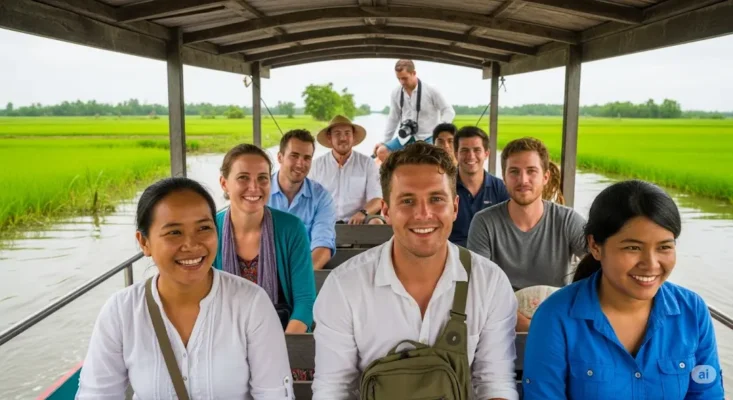
Vietnam offers a diverse tapestry of experiences, from the bustling streets of Hanoi and Ho Chi Minh City to the tranquil waters of Ha Long Bay and the Mekong Delta, and the mountainous landscapes of Sapa. While the general advice on vietnam safety applies countrywide, EssentialVietNamtravel.com highlights that regional safety variations do exist, though mostly in terms of specific activities or terrain rather than crime. Is vietnam a safe country to travel across its diverse regions? Generally, yes.
Hanoi: The capital city, Hanoi, is known for its rich history and vibrant street life. Hanoi safety is good for tourists who practice standard precautions. The Old Quarter can be crowded, so be mindful of pickpockets. Traffic is a significant factor; exercise caution when crossing streets. Using reputable taxis or Grab is recommended. Is Hanoi Vietnam safe? For most visitors, the experience is very positive and safe.
Ho Chi Minh City (Saigon): As Vietnam’s largest city, Ho Chi Minh City crime patterns are similar to Hanoi’s, with petty theft being the primary concern in tourist-heavy areas like District 1. Be vigilant with your belongings. The city is dynamic and exciting, and with awareness, it’s a safe place to explore.
Ha Long Bay: This UNESCO World Heritage site is a major draw. When choosing a cruise, opt for reputable companies with good safety records. Check boat safety features and reviews. Solo female travellers wondering “is vietnam safe for solo female travellers” will find Ha Long Bay generally welcoming, especially on organized tours.
Da Nang and Hoi An: These central Vietnam destinations are popular for their beaches and historic charm. Safety levels are high. Usual precautions against petty theft apply, especially in Hoi An’s crowded Ancient Town. Da Nang is a modern city with good infrastructure.
Mekong Delta: Exploring the waterways and villages of the Mekong Delta is a unique experience. When taking boat trips, ensure life jackets are available, especially if you are not a strong swimmer. Be mindful of food and water safety in more rural homestays. The region itself is very safe in terms of crime.
Sapa and Mountainous North: Sapa is famous for trekking and ethnic minority cultures. If trekking, especially on multi-day trips, consider hiring a local guide. Trails can be challenging, and weather can change quickly. Remote area safety here is more about navigating the terrain and weather than crime. Ensure you have appropriate gear. This region presents unique characteristics in terms of travel, different from the urban centers.
General Regional Considerations:
- Natural Disaster Preparedness: Vietnam can be affected by typhoons, particularly between June and November, impacting coastal and northern regions. Monitor weather forecasts during these times.
- Transportation in Vietnam: Outside of cities, road conditions can vary. If self-driving (which is less common for tourists), be aware of local driving habits. Long-distance buses are a common way to travel between regions; choose reputable companies.
- Respecting Local Cultures: Each region may have subtle cultural nuances. Being respectful always enhances your safety and experience.
Ultimately, whether you are exploring the ancient streets of Hanoi, the vibrant life of Ho Chi Minh City, the serene beauty of the Mekong Delta, or the hills of Sapa, Vietnam is a safe country for attentive and prepared travelers. Vietnam is it safe to travel across these diverse landscapes? Yes, with an understanding of the specific environment you are in.
The low violent crime prevalence makes even remote explorations generally secure from that perspective. Your travel planning should include research into the specific destinations on your itinerary. Enjoy the incredible diversity Vietnam offers, knowing that with sensible precautions, your journey can be a safe and enriching one. Vietnam is a safe country to visit, and its regional charms are accessible to those who travel wisely.

